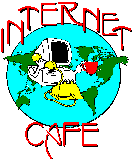Welcome to the Cyber Cafe
by Timothy K. Maloy
Cyber salon and cognitive coffee shop
But they aren't in Hamburg or anywhere near Germany, for that matter. They are tourists in Dublin, Ireland, and they've somehow managed to stumble upon the recently opened Underground Club, a cyber salon and cognitive coffee shop, as it were.
 They probably thought it was just another dank basement cafe, but
now they are Net surfing. This is a classic of Internet introductory
encounters. The young tourists have, of course, heard about the Internet
and the World Wide Web (who hasn't?), but until now they've never
seen it in action.
They probably thought it was just another dank basement cafe, but
now they are Net surfing. This is a classic of Internet introductory
encounters. The young tourists have, of course, heard about the Internet
and the World Wide Web (who hasn't?), but until now they've never
seen it in action.
"You see them -- they aren't here anymore (Dublin), they are in there," says Pat Woods, proprietor of the Underground, pointing to the terminal. Woods is a believer in what sci-fi author William Gibson called "the matrix," an electronic, synthetic world that is woven of vast computer networks. It is Gibson who coined the now famous term "cyberspace" to describe this alternative reality.
A future where computers get equal billing with food
Mark Dziecielewski, a United Kingdom resident, has compiled a Word Wide Web home page that list the cafes and has links to many of them. At last count, Dziecielewski's latest Cyber Cafe Guide listed over 110 cafes that offer Internet access with their coffee service.
The guide list nearly forty cyber cafes in the United States. These range from the ICON Byte Bar & Grill in San Francisco and the Internet Cafe in Scranton, Pennsylvania to The Hard Drive Cafe in Wichita, Kansas.
The promotions for these cafes are perhaps the herald of a cyber future where computers get equal billing with food. Look at what the Bean Central cyber cafe in Nashville, has to say about itself in the Dziecielewski listing:
"Bean Central opened in April, 1986, as a speciality coffee roaster and coffee bar. Now, in April, 1995, we have expanded with a comfortable 35-seat cafe," it says. But that's not all. "We have two Pentiums 75s w16 megs running wfwg 3.11 and Mosaic through a router, up an ISDN line to our provider and the WWW. We will add more machines as demand increases and if the webbers are not too rowdy."
At Bean Central they charge from $2 to $3 per-half-hour for Internet time.
Eccentric or not, these cyber cafes are proliferating
From a first person viewpoint, Dublin's Underground appeared somewhat like a fanciful version of an ashram with pillows and futons strewn about the floor for lounging about and low tables for tea, coffee, cakes and the vegetarian cuisine served here. The computer terminals are also on low tables -- the better to operate from a reclining position.
On the walls, are posters, paintings, Indian print tapestries and several tuxedos that have been hung as art. A free-roaming rabbit named "Harley" completes the tableau, adding a certain "Alice in Wonderland" quality to the place.
Eccentric or not, these cyber cafes are proliferating and offer something to interested Net novices and veterans alike. Some bill themselves as a convenience to traveling business types who just need a power outlet to run their laptops.
Like the ubiquitous Kinko's copy shops that act as the "branch" offices" for companies without desktop publishing gear, the cyber cafes may become the Internet access point for myriads of people. At these cognitive coffee shops of the future one won't need ownership of expensive computer equipment to get wired -- just coffee and a mouse.
If there isn't a coffee shop with Internet access in your locality now, there will be soon. The Cyber Cafe Guide will point you to them.